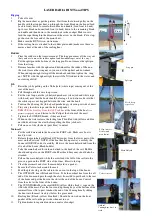
English
13
a.
Field strengths from fixed transmitters, such as base stations for radio
(cellular/cordless) telephones and land mobile radios, amateur radio, AM and
FM radio broadcast and TV broadcast cannot be predicted theoretically with
accuracy. To assess the electromagnetic environment due to fixed RF
transmitters, an electromagnetic site survey should be considered. If the
measured field strength in the location in which the Pulmolife is used exceeds
the applicable RF compliance level above, the Pulmolife should be observed
to verify normal operation. If abnormal performance is observed, additional
measures may be necessary, such as re-orientating or relocating the
Pulmolife.
b
Over the frequency range 150 kHz to 80 MHz, field strengths should be less
than 3 V/m.
Recommended separation distances between portable and mobile RF
communications equipment and the Pulmolife
The pulmolife is intended for use in an electromagnetic environment in which
radiated RF disturbances are controlled. The customer or the user of the
pulmolife can help prevent electromagnetic interference by maintaining a
minimum distance between portable and mobile RF communications
equipment (transmitters) and the pulmolifw as recommended below,
according to the maximum output power of the communications equipment.
Rated Maximum
Output Power of
Transmitter in Watts
(W)
Separation Distance in Meters (m) according to
Frequency of Transmitter
150 KHz to
80 MHz
d = 1.2√P
80 MHz to
800 MHz
d = 1.2√P
800 MHz
to 2.5 GHz
d = 2.3√P
0.01
0.12
0.12
0.23
0.1
0.38
0.38
0.73
1
1.2
1.2
2.3
10
3.8
3.8
7.3
100
12
12
23.3
For transmitters rated at a maximum output power not listed above, the
recommended separation distance d in metres (m) can be estimated using the
equation applicable to the frequency of the transmitter, where P is the
maximum output power rating of the transmitter in watts (W) according to the
transmitter manufacturer.
NOTE 1 At 80 MHz and 800 MHz, the separation distance for the higher
frequency range applies.
NOTE 2 These guidelines may not apply in all situations. Electromagnetic
propagation is affected by absorption and reflection from structures objects
and people
Summary of Contents for PulmoLife
Page 2: ......
Page 4: ......
Page 44: ...40 Deutsch 5 Sekunden selbstst ndig ab...
Page 119: ...115 VII PULMOLIFE PulmoLife 1 1 1 1 1 2 PULMOLIFE...
Page 120: ...116 WEEE IPX0 PulmoLife 35...
Page 121: ...117...
Page 122: ...118 ECCS NHANES III 45 ECCS NHANES III 0 00 PulmoLife 0 00 1 1...
Page 123: ...119 3 1 80 1 20 90 30 90 1 100 3 CareFusion PeraSafe 36 SSC5000A PulmoLife 36 SST1000...
Page 124: ...120 PeraSafe 10 PulmoLife PulmoLife 3 36 SM2125 Ch 0 00 3 3 3 2 91 3 09...
Page 125: ...121...
Page 126: ...122 MicroGard PulmoLife 3 bAt 5 3...
Page 127: ...123 Prd 1 ECCS4 2 NHANES III5 3 6 rE PulmoLife bAt 5...
Page 128: ...124 IEC 60601 1 B 3 CR 2450 IEC 60601 1 B...
Page 137: ...133 0086 93 42 WEEE SGS Testing Services OSHA...
Page 138: ...134 Enter IX PULMOLIFE PulmoLife FEV1 FEV1 FEV1 FEV1 COPD1 2 PULMOLIFE...
Page 139: ...135 WEEE IPX0 PulmoLife COPD COPD 35 COPD...
Page 140: ...136 Enter ECCS NHANES III 45 ECCS NHANES III 0 00 PulmoLife 0 00 FEV1 FEV1...
Page 142: ...138 PulmoLife Pulmolife 3 36 SM2125 Ch 0 00 3 3 3 2 91 3 09 MicroGard...
Page 143: ...139 PulmoLife 3V bAt 5 3V EU...
Page 144: ...140 Enter Prd 1 ECCS4 2 NHANES III5 3 6 Enter rE Pulmolife bAt 5...
Page 145: ...141 IEC 60601 1 B 3V CR 2450 IEC 60601 1 B...
Page 153: ...149 B 0086 93 42 EEC WEEE Rx SGS...
Page 155: ......
















































